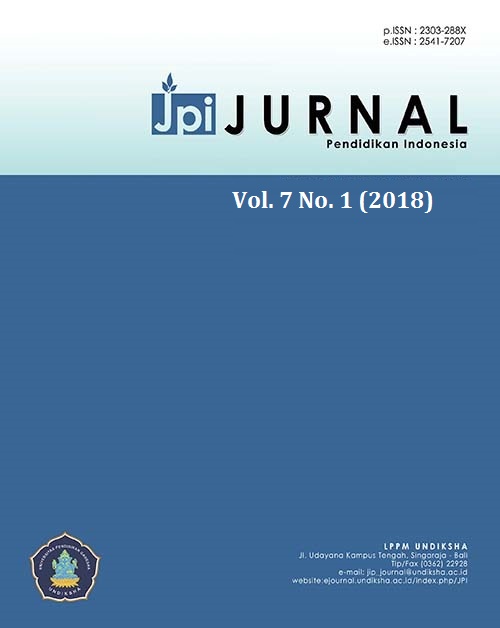IMPROVEMENT OF MATHEMATICAL ABILITY THROUGH DISCOURSE TEACHING WITH MATHEMATICAL BELT LINE AT THE FOURTH GRADE OF ELEMENTARY SCHOOL
DOI:
https://doi.org/10.23887/jpi-undiksha.v7i1.11722Kata Kunci:
Mathematical Understanding, Discourse Teaching, Mathematical Bet Line StrategyAbstrak
This study was done in response to Farida’s finding ( Farida, 2015) about the analysis of errors made by the eighth grade students of junior high school in one of the schools in solving mathematical story problems which showed that their mathematical ability was still low. The students’ low ability in solving mathematical story problems was caused by their low ability in understand mathematics. This aim was aimed at describing data on students’ ability in understanding mathematics as the result of the implementation of discourse teaching with Mathematical Bet Line strategy. This study was a quasy experiment with nonequivalent control group design. The sample consisted of all students of the fourht gradde in one schooll in Kuningan district, Kkuningan regency. The study used mathematical ability test based on indicators developed by Skemp (1976). The statistical analysis used in this study was independent sample t-test. The result showed that the improvement in the students’ mathematical understanding ability of those who learned through discourse teaching with Mathematical Bet Line strategy was better than that of those who learned through Direct Instruction in the topic criterion. Fraction the improvement in mathematical ability was shown by N-gain of 0.67 , falling in the medium criterion.
Referensi
Anggraeni, F. 2016. Analisis kemampuan pemahaman konsep matematis dan kemandirian belajar siswa. [Online]. Diakses dari: https://www.academia.edu/29775444/ANALISIS_KEMAMPUAN_PEMAHAMAN_KONSEP_MATEMATIS_DAN_KEMANDIRIAN_BELAJAR_SISWA.
Arends, R. I. 2008. Learning to Teach. Edisi Ketujuh. Yogyakarta: Pustaka Pelajar.
Bennett, C. A. 2014. Greating cultures of participation to promote mathematical discourse. Midle School Journal, pp. 20-25.
Bofferding, L., & Kemmerle, M. 2015. Elementary teacher candidates’ use of number strings: Creating a math-talk learning community. Mathematics Teacher Educator, 3(2), pp. 99–115.
Creswell, J. W. 2016. Research Design. [Achmad Fawaid, Trans]. Yogyakarta: Pustaka Pelajar.
Dick, L., White, T. F., Trocki, A., Sztajn, P., Heck, D., & Herrema, K. 2016. Supporting sense making with mathematical bet lines. Teaching Children Mathematics, 22 (9), pp. 538-545.
Farida, N. 2015. Analisis kesalahan siswa SMP kelas VIII dalam menyelesaikan masalah soal cerita matematika. Aksioma, 4 (2), pp. 42-52
Kersaint, G. 2015. Talking math: How to engage students in mathematical discourse. [Online]. Accessed from: http://www.gettingsmart.com/2015/09/talking-math-how-to-engage-students-in-mathematical-discourse/.
Kilpatrick, J., Swafford, J., & Findell, B. (Eds.). 2001. Adding it up: Helping children learn mathematics. Washington, DC: National Academy Press.
Kramarski, B., Mevarech, Z., & Arami, M. 2002. The effects of metacognitive instruction on solving mathematical authentic tasks. Educational Studies in Mathematics, 49 (2), pp. 225–250.
Kristiana, D. & Suyanto, W. 2013. Implementasi heuristic problem solving dalam menyelesaikan soal cerita untuk meningkatkan prestasi dan sikap matematika. Jurnal Prima Edukasia, 1 (1), pp. 17-29.
Lynch, S. D. & Bolyard, J. J. 2016. Putting mathematical discourse in writing. Mathematical Teaching in the Middle School, 17 (8), pp. 486-492.
Martin, C., Polly, D., McGee, J., Wang, C., Lambert, R., & Pugalee, D. 2015. Exploring the relationship between questioning, enacted mathematical tasks, and mathematical discourse in elementary school mathematics. The Mathematics Educator, 24 (2), pp. 3–27.
Mercer, N. 2008. Talk and the development of reasoning and understanding. Human Development, 51, pp. 90–100.
Morocco, C. C., et al. 2008. Supported literacy for adolescents: Transforming teaching and content learning for the twenty-first century. San Fransisco: Jossey-Bass A Wiley Imptint.
National Council of Teacher of Mathematics. 2014. Principle to acions: Ensuring mathematical success for all. USA: NCTM.
Ratzel, M. 2013. A common core challenge you can tackle: mathematical discourse. [Online]. Accessed from: https://www.teachingchannel.org/blog/2013/04/05/mathematical-discourse/.
Reeder, S. L. & Abshire, G. E. 2012. Talking about the greek cross. Mathematics Teaching in the Middle School, 17 (9), pp. 558-563.
Skemp, R. R. 1976. Relational understanding and instrumental understanding. Mathematics Teaching, 77, pp. 20-26
Soviawati, E. 2011. Pendekatan Matematika Realistik (PMR) untuk meningkatkan kemampuan berfikir siswa di tingkat sekolah dasar. Edisi Khusus, 2, pp.79-85Stein, C. C. (2007). Let's talk: promoting mathematical discourse in the classroom. The Mathematics Teacher, 101 (4), pp. 285-289.
Steele, D. F. 2007. Understanding students’ problem-solving knowledge through their writing. Mathematics Teaching in the Middle School, 13 (2), pp. 102–109.
Stiles, J. 2016. Supporting mathematical discourse in the early grades. Education Development Center, Inc.
Syaripudin, T. & Kurniasih. 2013. Landasan filsafat pendidikan. Bandung: Percikan Ilmu.
Trends in International Mathematics and Science Study. 2015. TIMSS 2015 assessment framework. Chestnut Hill: TIMSS & PIRLS International Study Center.
Trocki, A., Taylor, C., Starling, T., Sztajn P., & Heck, D. 2014. Launching a discourse-rich mathematics lesson. Teaching Children Mathematics, 21 (5).
Walle, J. A. V. D. 2006. Matematika sekolah dasar dan menengah jilid 1. Jakarta: Erlangga.
Wilson, P. H., Sztajn, P., Edgington, C., Webb, J., & Myers, M. 2017. Changes in teachers’ discourse about students in a professional development on learning trajectories. American Educational Research Journal, 20 (10), pp. 1-37.
Yastika, N. & Haryanto. 2016. Pengaruh metode PBL dan metode expository terhadap hasil belajar matematika pada siswa kelas V. Jurnal Prima Edukasia, 4 (1), pp. 107–119.
Unduhan
Diterbitkan
Terbitan
Bagian
Lisensi
Authors who publish with the Jurnal Pendidikan Indnesia agree to the following terms:
- Authors retain copyright and grant the journal the right of first publication with the work simultaneously licensed under a Creative Commons Attribution License (CC BY-SA 4.0) that allows others to share the work with an acknowledgment of the work's authorship and initial publication in this journal.
- Authors are able to enter into separate, additional contractual arrangements for the non-exclusive distribution of the journal's published version of the work (e.g., post it to an institutional repository or publish it in a book), with an acknowledgment of its initial publication in this journal.
- Authors are permitted and encouraged to post their work online (e.g., in institutional repositories or on their website) prior to and during the submission process, as it can lead to productive exchanges, as well as earlier and greater citation of published work. (See The Effect of Open Access)








